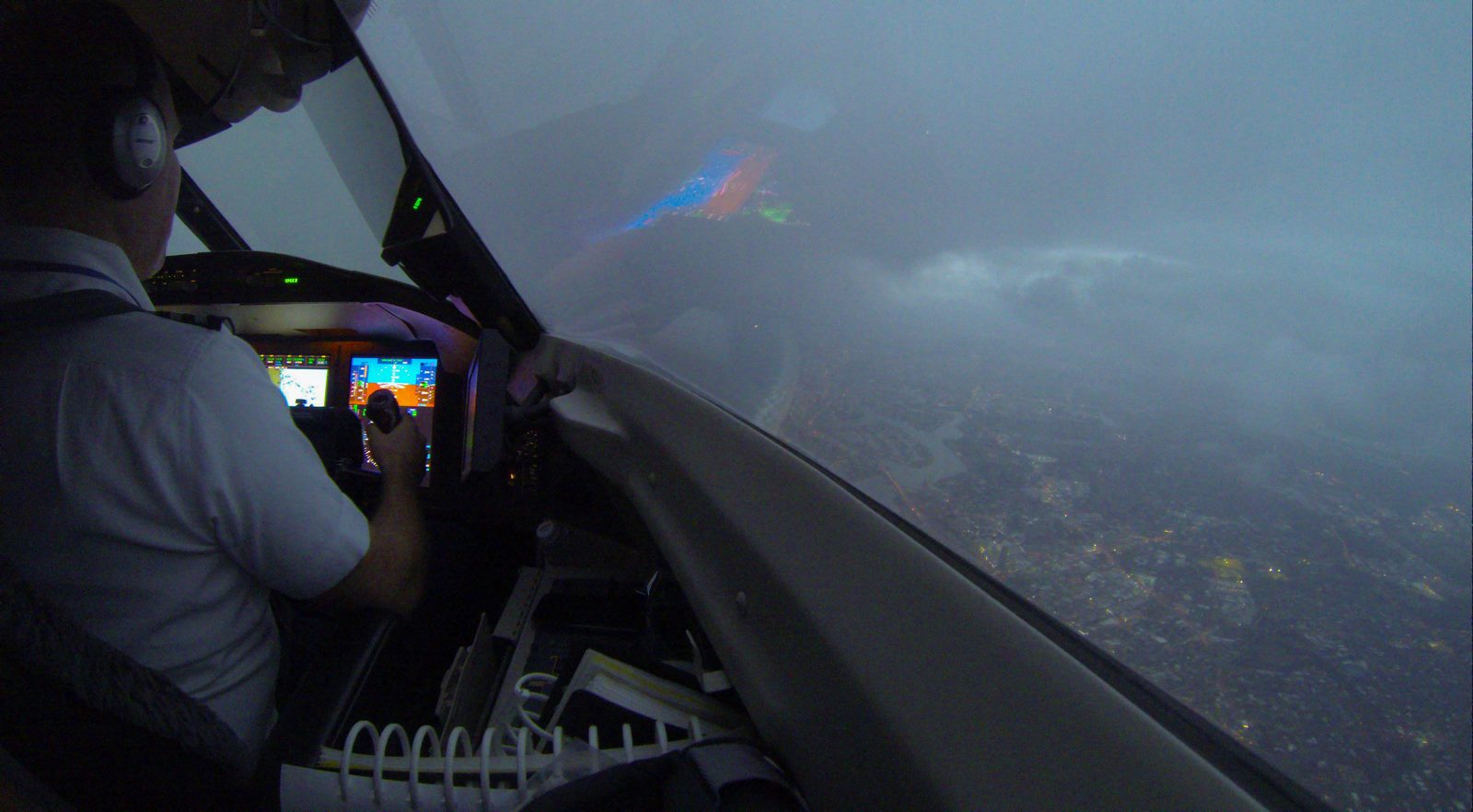Flight Experience 2 – Challenger 605
The Scare over Australia
This is a post about a scary situation I once had flying the Challenger 605 over Australia.
We were on a two week trip around Southeast Asia and Australia. The aircraft was a Challenger 605 with two pilots, one flight attendant, and eight passengers.
The trip started from Ningbo, China to Bali, Indonesia, with a fuel stop in Sanya. Nothing really exciting happened on the first day. Just the usual stuff of following our preselected airways and navigating around occasional thunderstorms. We got up to 40,000 feet which is higher than most airliners usually fly at. At this altitude we were able to overfly most of the bad weather, but later in the afternoon the storm buildups exceeded even that altitude. But that’s normal when you cross from South China Sea to Java Sea and finally to Bali Sea.
“So this is where that Malaysia Airlines Flight 370 got missing?”
“Yep, too bad they haven’t implemented that new ADSB system around here..”.
ADSB vs GPS
As pilots we can use the wide coverage of GPS (Global Positioning System) satellites to navigate, but the aircraft location information is not received by ground stations. So the air traffic controllers don’t necessarily know the exact aircraft location unless we are in airspace with ground radar coverage.
Ground radars are used in major airports and cover wide areas of airspace along the airways and coast lines, but they basically need a line of sight to the aircraft. Flying far over the oceans we are often outside of radar coverage and have to rely on position, speed, and time reporting to stay clear of other aircraft.
There is a new system called the ADSB, or automatic dependent surveillance broadcast, that provides real time tracking of aircraft via signals from the aircraft to the satellites and down to ground stations.
Our aircraft was one of the first aircraft in our fleet to receive the upgraded ADSB equipment. We were required to do a short online course about the operation of the system. Although the system is not yet widely used around the world, in Australia it was mandatory to enter certain airspaces. It was good timing for us to do the training and get the equipment upgrade.

Navigating around clouds to make the flight smoother for the passengers. The job is all about customer service.

Our trip involved layovers in seven countries: 1. China 2. Indonesia 3. Australia 4. New Zealand 5. Fiji 6. Brunei 7. Thailand and back to China.
There was really not much training involved. Just study how it works. There are no pilot actions involved other than checking the correct transponder mode and one other thing… that I will mention later.
Anyway, if the ADSB system was mandatory everywhere and if it couldn’t be turned off during flight I doubt airplanes would go missing like the MH370 did.
Bali
We had a great stay in Bali. Not my first time there but still found some funky souvenirs… Maybe that’s what jinxed us for the next leg.
After couple of days in Bali we continued our trip to Gold Coast, Australia. It was about six hours of flying.
We exited the Bali airspace passing 18000 feet for flight level 350. FL350 is 35000 feet or about 11600 meters. Good altitude for our aircraft to fly fast and economically.
We were approaching the northern Australia airspace fast. “Nothing we need to do about the ADSB, right?” “Right, we turned the transponder on already on the ground like we always do.”

Souvenir from Bali
Crossing to Australia
Bali Control: “Challenger CL605 contact Darwin control at 122.175”
Us: “Roger, 122.175, Challenger 605. Have a good day.”
I don’t know if the guy’s name was Roger. Kind of doubt it actually. But that’s just how we talk in the air. Roger meaning “ok”, “okay mate”, “got it”, “stop bugging me”, or something like that. And instead of “Challenger 605” we used our registration number that I shouldn’t reveal here.
Us: “Darwin control, Challenger 605 with you passing flight level 220 for flight level 350.”
Darwin Control: “Challenger 605, radar contact, stop climbing at flight level 270 as your final altitude.”
Us: “Roger, leveling off at FL270. But request FL350 as filed.” Flight level 350 was filed as our requested altitude in our flight plan and the controllers should know it.
Darwin Control: “Negative. FL350 not available because you are not ADSB approved. You need to stay below flight level 290.”
Us: “Bu.. bu.. but we are ADSB approved..”
Darwin Control: “Not according to my paperwork. But standby, I will check it.”
Aaah.. that was the other thing we were supposed to check. Check that there is a correct equipment code filled in the flight plan. In the flight plan there is this item number 10 that needs to be filled with codes that lists all the navigational equipment we have on board. Based on those codes the air traffic controllers know what we are capable of doing and how we navigate. Not all aircraft navigate using the same equipment. In our company the office workers file the flight plans, not the pilots. And I guess the person filing it wasn’t aware of our new ADSB equipment.
Our conversation was something like this: “Hey, did you check the flight plan?” “Of course I did. It’s right here and I’m using it to follow our predicted fuel burn and times at our waypoint.” “…and I checked the item 10, juts forgot what I was supposed to check.”
On the item 10 we had these codes: SDE1E2E3FGHIJ1J5M3RWXY instead of SDE1E2E3FGHIJ1J5M3RWXY/LB1. Yes, that’s right. We are supposed to know what each letter stands for. S is for certain type of transponder. D is for distance measuring equipment. E1 is for ..who knows and so on. We were missing the LB1 in the flight plan which would have told the controller that we have the required equipment to enter ADSB airspace. You can check out those codes here if interested: ICAO flight plan codes.
This was not good. If we had to stay down at 27000 feet we would be hitting every cloud on our way for the next six hours and our fuel burn would be considerably higher. We would have to start checking alternative airports for a fuel stop if necessary.
But of course we knew we were ADSB approved, just had to convince the controller about it. There is a satellite phone behind the left seat in the cockpit. We started calling to our company and let them sort it out. By the time we got hold of someone we got a call from the radio.
Darwin Control: “Challeger 605, confirm you are ADSB capable.”
Us: “That’s affirmative. Confirm.”
Darwin Control: “Roger, climb and maintain FL350.”
Us: “Sweet”
And life was good again. I don’t know if they confirmed the issue from our company or just decided to trust what we were saying. Didn’t matter.
That was not the scary part of the leg. Keep on reading.

Storm buildups in the distance. Not a good idea to fly through them.
Up at the Altitude
We got up to 35000 feet and leveled off. What should we do for the next five hours until it’s time to prepare for landing? Nothing much to do up there. Talk? Maybe for a while. Read a book? Sure.
Few hours later we were closing in to our destination of Gold Coast. It was the first time in Australia for all of us. Exciting.
“So, I wonder if those Aussies hop around like kangaroos or what’s their deal?”
“I don’t know but they sure sound funny.. mate!”
“If I ever have to fly with an Aussie capt..” Didn’t have chance to complete the sentence as the aircraft interrupted us.
DING DING DING SMOKE!!!
DING DING DING SMOKE!!! The aircraft said and red warning lights started flashing in the cockpit.
Holy crap! I thought, as my heart briefly stopped. That was the aircrafts in-your-face way of telling us to stop daydreaming and pay attention! We might have a fire!
What should we do? Use a checklist? Which checklist? Where is it? Should we do memory items? Are there memory items for smoke alarm? Should I put on the oxygen mask? What about the smoke goggles? Where is the fire extinguisher? How does it work again? Should we make an emergency descent? Should we call for help? What for what can anyone else do? Stupid. Are we going to crash and burn? Airplanes can talk? Shit! Aviate, Navigate, Communicate; that’s what we should start with.
All this mental work in a split second.
“Ok, no smoke in the cockpit. You fly and I will get the fire extinguisher and go check what’s happening in back…” That’s what I was about to say when I heard a voice behind me.
“Hmm, sorry for interrupting guys.” Our cabin attendant said. “We are required to fumigate the aircraft before opening the doors after landing. I was going to do it now before we land to save some time on the ground. When I pressed the button on the fumigation spray bottle the button got stuck in making the bottle act like a smoke bomb. I left the bottle spraying in the luggage compartment and I think it activated the smoke alarm.. sorry.”
“Oh, okay thanks.”
Welcome to Australia!
So, flying to Australia there are some requirements I have not experienced going anywhere else. They require us to fumigate the aircraft in case of insects from other countries spreading to their continent. It has to be done with certain type of pesticide spray and we have to show the empty bottle through the window to the customs agents before opening the doors on the ground. The spray bottle works so that once you press the button in the bottle keeps spraying until it’s empty. Our cabin attendant didn’t know this and she was just going to spray little bit here and there. But since she couldn’t turn it off she left it in the luggage compartment where it set off the smoke alarm.
I ended up getting up anyway and take a look in the back. Just to be sure there is no actual fire. On my way to the back I saw the passengers were all sitting up looking around. The fire alarm in the cockpit is loud and the passengers had heard it also. Everything in the back was normal except it was stinking from the pesticide. The cabin attendant told the passengers what had happened and everyone relaxed again.
Happy flying rest of the way. Scared us for nothing and we were like:

Ok, Scott didn’t say that! But that is an actual conversation I had with another dude once.
Followed by an awkward silence.. =)
Moral of the Story
Don’t use any sprays or smoke during flight! Even if there is no real fire you might scare the pilots and then you have a problem!
I don’t know if any pilots have been literally scared to death, but a heart attack is possibility. Look what happed when the pilot in the the Mountain Between Us movie got a heart attack!?
The Good News
The good news for us obviously was that it was a false alarm. But also fire during flight is extremely rare. And if there is a fire the crew is trained to deal with it.
In fact my next firefighting training will be in few months. I will write more about it then.
Also fire at altitude could be taken out by depressurizing the aircraft and sucking out the air that feeds the fire. In such extreme situation the crew would of course notify the passengers and make sure everyone had their oxygen masks on. You can be confident that the crew will handle the situation best way possible. That’s why we train regularly.

Suppressing fires in controlled environment in Montreal.
Australia
We didn’t get to spend much time in Australia but the people there were great. First we parked the airplane to a VIP business terminal. Once we got in to the office and lounge someone asked us:
“Would you like something to drink?” “No, I’m good.” “Are you sure? We have beeee….. – (the cool air of the fridge, I had opened, hit my face by the time he finished his sentence) – …eerrrr. Oh, you found the beer”. He finished.
See, I can act quickly when necessary! Just kidding. It didn’t really go like that but they offered us beer and we took couple of them with us to the hotel. Why not.
And when we left the place couple days later they gave us a six pack of beers each to take away! A great Flight Experience!

Those are actually Fat Yak beers from Australia in a Corona carton. Not a bad trip!
I hope you enjoyed this Flight Experience post. Please leave a comment and subscribe to my newsletter!
-Vesa
PS. About a year later I started to fly with an Aussie captain regularly. Good times!
More Similar Posts
For more similar posts you might want check out my Flight Experience Page! Or for all aviation posts you should go to my Aviation Page.
If you are just looking to see something fun you will like this Airplane Spinning Video. For all my videos you should check out my YouTube Channel, and don’t forget to subscribe to the channel!
Pi Network – Did You Follow My Advice? You might be sitting on $100k or more!
The Pi Network: A Revolutionary Approach to Cryptocurrency A [...]
FunkyPilot Academy LIVE on Kickstarter!
The FunkyPilot Academy Comic Book Series is Available NOW! [...]
Artificial Intelligence (AI) as an Air Traffic Controller?
01001000 01100101 01101100 01101100 01101111 00100001! In case you [...]
Let’s talk about First Officers
Let's talk about First Officers, There is a lot [...]
FunkyPilot Academy – Comic Book Fonts and Design
Howdy, In my last post, you saw some screenshots [...]
Introduction to the World of FunkyPilot Academy!
Here is a quick introduction to the World of [...]











I love the way you tell a story. I was right there with you on that plane. Bit fearful once you said fire. Glad it was just a bit of bug spray.
Thanks for your comment Hazel! Yes, it was a scary situation at first but luckily it was just a false alarm.